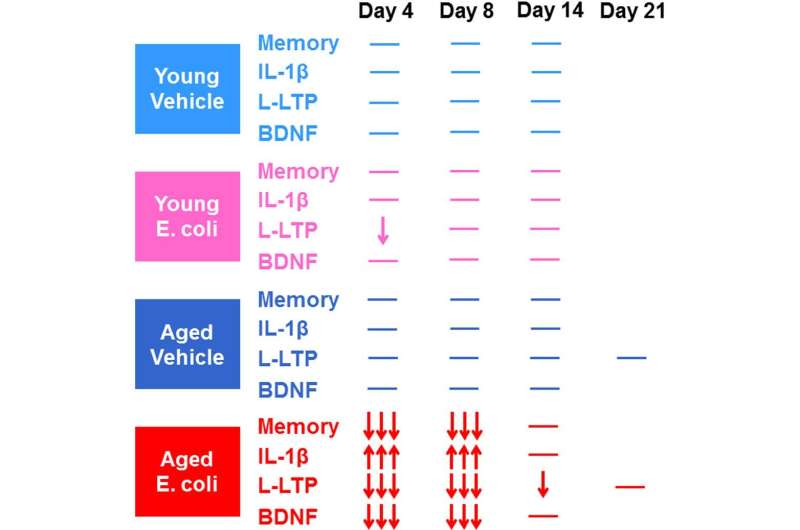A summary of the effects of age and infection at multiple time points after injection of E. coli or saline. Memory = hippocampus-dependent long-term memory; IL-1β = levels of pro-inflammatory cytokine interleukin-1 beta in hippocampal synaptoneurosomes; and L-LTP = theta burst-evoked L-LTP in the hippocampal CA1 area; and BDNF = levels of mature BDNF and activity of related proteins in hippocampal synaptoneurosomes. Upward arrows indicate an increase, and downward arrows show a reduction. Three arrows represent severe deficits, and one arrow means impairments to a lesser degree. Horizontal lines indicate baseline values. Data summarized for Day 4 are drawn from earlier publications: Memory & IL-1β (Barrientos et al., 2006; Barrientos et al., 2009), L-LTP (Chapman et al., 2010), and BDNF (Cortese et al., 2011). Credit: Tanaka et al., eNeuro (2018)
Activation of the immune system by an infection may temporarily disrupt formation of long-term memories in healthy, aging rats by reducing levels of a protein required for brain cells to make new connections, suggests new research published in eNeuro.
Cognitive decline in old age is thought to be gradual, as in Alzheimer's disease. However, an abrupt or more rapid deterioration of brain function called delirium is also common in aging, but much less studied. Although most individuals will recover from periods of delirium, these episodes, which can be triggered by an exaggerated immune response, may increase risk of dementia.
Susan Patterson and colleagues previously found that 24-month-old rats infected with the bacteria Escherichia coli have a prolonged immune response and memory impairments compared to 3-month-old rats. The researchers have now extended these findings to show that the immune response in older rats persists for eight to 14 days and is associated with reduced levels of brain-derived neurotrophic factor (BDNF), a protein that enables the hippocampus to create long-term memory. The rodent model of delirium described in this study could inform future research to understand how surgery, infection, and injury—factors that activate the immune system—affect cognitive function in elderly humans.
More information: Naoto Tanaka et al, Aging and an Immune Challenge Interact to Produce Prolonged, but Not Permanent Reductions in Hippocampal L-LTP and mBDNF in a Rodent Model with Features of Delirium, eneuro (2018). DOI: 10.1523/ENEURO.0009-18.2018
Provided by Society for Neuroscience




















